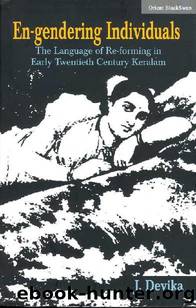Engendering Individuals by J Devika

Author:J Devika [Devika, J]
Language: eng
Format: epub
Publisher: Orient BlackSwan Private Ltd.
Published: 0101-01-01T00:00:00+00:00
CHAPTER 5
'Unnamable Discontent'
PROBLEMATISING REFORM
By the 1930s, the issue of re-forming women to make them conform to an idealised Womanly subjectivity was being actively discussed. Much of this discussion was directed against obstructive tradition, but the discussion was a highly complex one. For instance, the question was increasingly raised as to whether the domain of modern domesticity was really the space that offered greater mobility and power to women. This implies a process of questioning of the claims of the 'modern' â did it truly provide adequate conditions for women's self-realisation within its own terms? The possibility of engagement with modern ideals of Womanhood or Manhood, domesticity, motherhood, Individuality, public life and so on grew stronger; there was not merely simple receptiveness1 to modern ideals of gender circulating in and through reformisms but also acceptance characterised by efforts to probe, reorganise and reimagine them.
The writings of Lalitambika Antarjanam (1909â88) are important in this sense. In her work written over a period stretching from the 1930s to the 1980s we find a complex engagement with modern ideals of gender and Individuality. Born in a relatively less conservative Malayala brahmin family, she was educated at home, and came in contact with the politico-cultural milieu of early twentieth century Malayalee society at a relatively early age.
In an interview, Antarjanam has spoken about the liberal education and modern ways of life in her childhood home. She had tutors for all subjects; the house was always full of poets and artists, and she recalls the debates on Malayalam language and literature between her uncles, who were disciples of Kerala Varma and Raja-raja Varma, and between one uncle who favoured the nationalists, and another who favoured the King. She mentions that all the Malayalam books, newspapers and magazines of those times reached her home, and that there was a separate reading room.2 An active supporter of Malayala brahmin (Nambutiri) reformism, she attended the Nair Conference at Mavelikkara in 1932 without the cloak and cadjan umbrella that were traditionally the obligatory dress code of all Antarjanams.3 In 1934, her play on widow-remarriage, titled Vidhavavivaham was performed at Kulakkada.4 By the end of the 1930s she was well known for her short stories among which a great many were bitterly critical of traditional life. However, Malayala brahmin reformism was certainly not the horizon of her writings. Some of her short stories like Itu Ashasyamano? (1935) and Prasadam (1939) are severely critical of Nambutiri reformism. The same period saw many of her most powerful critical reconstructions of life in the patriarchal brahmin illams â Moodupadattil (1939) Kuttasammatam (1940) etc.
Like many of her female contemporaries, Antarjanam too expressed a certain unease with modern domesticity â even while admitting that she was within more or less an ideal domestic setting. A friend remembers her words to him: 'Some unnamable discontent, terrible desire, is constantly gnawing my heart. A feeling that god had entrusted me with some noble responsibility, that I had not yet fulfilled even the smallest part of it.'5 Commenting favourably
Download
This site does not store any files on its server. We only index and link to content provided by other sites. Please contact the content providers to delete copyright contents if any and email us, we'll remove relevant links or contents immediately.
| Anthropology | Archaeology |
| Philosophy | Politics & Government |
| Social Sciences | Sociology |
| Women's Studies |
Cecilia; Or, Memoirs of an Heiress — Volume 1 by Fanny Burney(31333)
Cecilia; Or, Memoirs of an Heiress — Volume 3 by Fanny Burney(30934)
Cecilia; Or, Memoirs of an Heiress — Volume 2 by Fanny Burney(30889)
The Great Music City by Andrea Baker(21318)
We're Going to Need More Wine by Gabrielle Union(18074)
Bombshells: Glamour Girls of a Lifetime by Sullivan Steve(13109)
Pimp by Iceberg Slim(12932)
All the Missing Girls by Megan Miranda(12752)
Fifty Shades Freed by E L James(12451)
Norse Mythology by Gaiman Neil(11884)
Talking to Strangers by Malcolm Gladwell(11879)
Crazy Rich Asians by Kevin Kwan(8351)
Mindhunter: Inside the FBI's Elite Serial Crime Unit by John E. Douglas & Mark Olshaker(7834)
The Lost Art of Listening by Michael P. Nichols(6474)
Enlightenment Now: The Case for Reason, Science, Humanism, and Progress by Steven Pinker(6406)
Bad Blood by John Carreyrou(5770)
The Four Agreements by Don Miguel Ruiz(5511)
Weapons of Math Destruction by Cathy O'Neil(5038)
We Need to Talk by Celeste Headlee(4871)
